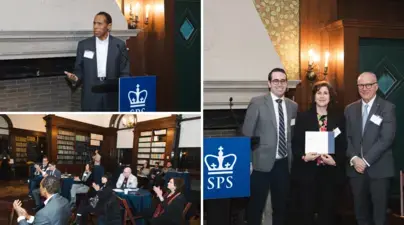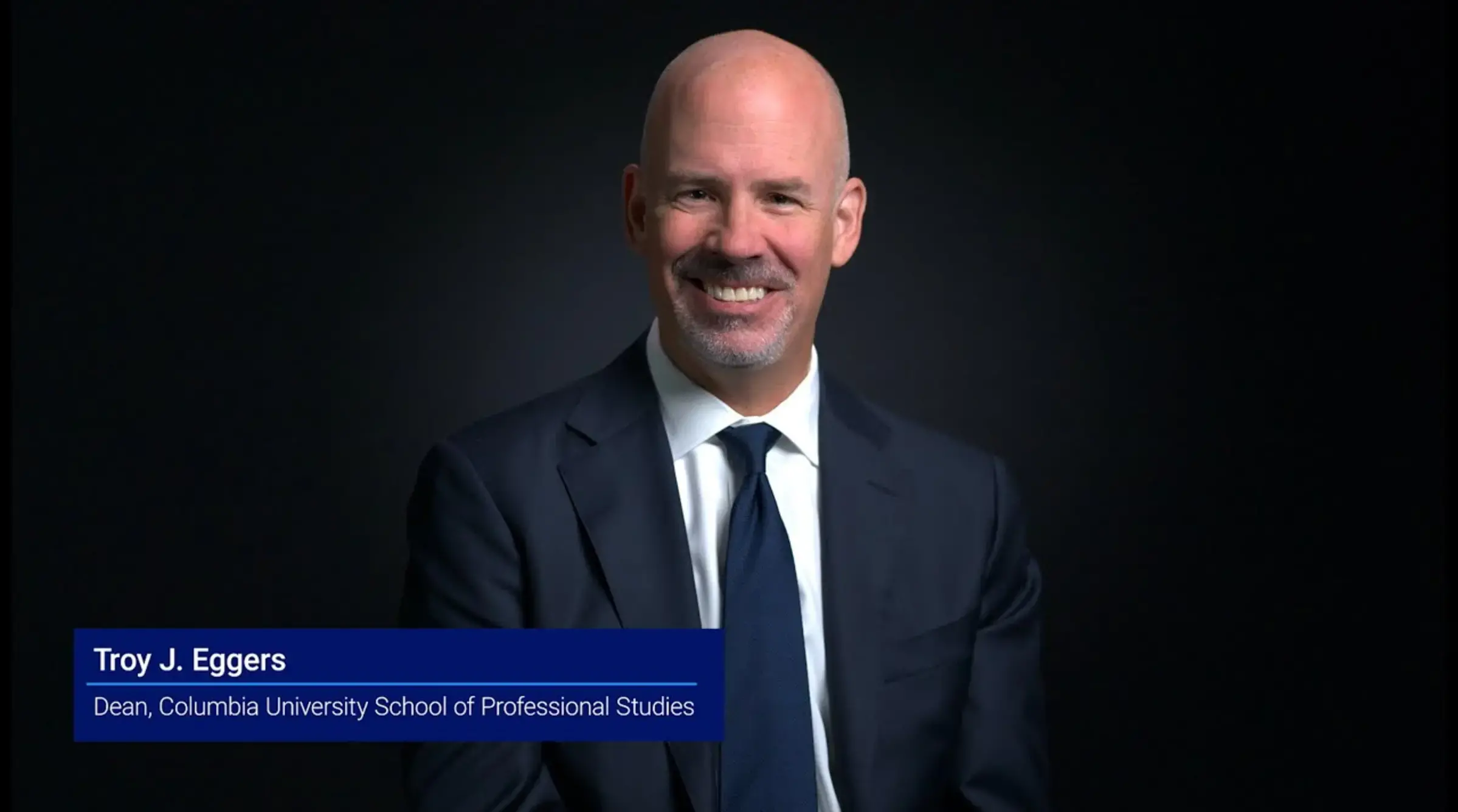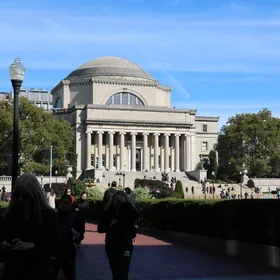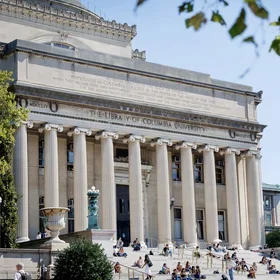C-Suite experts need training to be successful as instructors. This spring semester, thirty-one lecturers gathered to celebrate their completion of the Columbia University School of Professional Studies (SPS) Pedagogical Lab, an intensive training course in effective instruction for lecturers. Designed by the School’s Online Curriculum and Instruction (OCI) team, the SPS Pedagogical Lab uses evidence-based strategies to drive learning outcomes across modalities. “The training, learning, and real-time application have been enlightening, enjoyable, and beneficial for me, and I believe it will be for my students as well,” said Dr. Ramone Segree, who teaches the Fundraising Fundamentals course for the M.S. in Nonprofit Management program.
During the celebration—which took place at the Italian Academy—members of the first and second cohorts received certificates of completion and digital badges. In February, the Lab welcomed its third cohort, composed of more than 40 lecturers representing more than 10 SPS academic and professional programs. This will be the first group solely facilitated by previous participants of the Lab.
“Faculty love learning from other faculty, and we are eager to see how participants’ experiences in the Lab are enhanced through faculty-to-faculty instruction and mentorship,” says Phoebe Ballard, the executive director of online learning operations. She oversees the work of the OCI team, which created the Lab. Part-time lecturers Dr. Zava Aydemir (Enterprise Risk Management), Betsy Keating (Negotiation and Conflict Resolution), Dr. Jack McGourty (Pre-College Programs), and Christine Straw (Negotiation and Conflict Resolution) are among those who are facilitating the third cohort this spring.

Through the School’s signature scholar-practitioner faculty model, SPS students learn from lecturers who draw on their real-world career experiences and insights. The Lab, however, unpacks lecturers’ areas of expertise and challenges them to present their knowledge in ways that meet the varied needs of students. Each lecturer dedicates approximately four hours per week for 13 weeks, completing assignments designed to guide them in their instructional preparation and delivery. Because the Lab assignments and discussions are mostly virtual, lecturers can practice various virtual learning tools and practice tactics such as objective mapping and storyboarding. Additionally, they participate in live forums and workshops covering topics such as bias and identity; accessibility; classroom climate; and the legal and ethical imperatives for inclusion.
“Past participants report that the keystone to the Lab is a profound gain in pedagogical strategies that can be applied immediately in the classroom, ultimately leading to confidence in their identity as SPS instructors,” said Phoebe Ballard, the executive director of online learning operations. Said Dr. Zachary Kornhauser, the senior director of assessment and faculty development: “The Pedagogical Lab has elevated the instruction provided by faculty who have engaged with the program, and has the firm potential to enrich student learning experiences across the institution and allow SPS to retain highly-qualified faculty instructors.”
Ballard, based on feedback during the January celebration, said common themes emerged from the 31 lecturers who’d completed the Lab:
- From Experts to Educators: “Rather than just delivering lectures as the expert in the front of the class,” she said, faculty “now see their role as a facilitator, coach, or guide, which helps them to focus on learning and engagement, maintain empathy for the student experience, and capitalize on the rich and varied perspectives and backgrounds that each SPS student brings to the classroom.”
- More Active Student Engagement: Lecturers reported a positive relationship between planning and student engagement. By using tried-and-true methods to prepare for in-class discussions and activities, they felt more present and able to facilitate the exchange of ideas. “The strategies they applied in thoughtfully designing and planning learning activities led to an increase in student engagement and made each class session more relaxed and enjoyable to teach,” Ballard said.
- Immediately Applicable Feedback: Instead of reinventing the wheel, participants said, the Lab helped them take action based on student feedback. “For instance, Dr. Ramone Segree transformed a high-stakes final project into several formative assessments,” said Ballard. Dr. Segree’s “revised approach created more opportunities for feedback, helped students and the instructor better gauge student progress toward the learning objectives, and provided additional dialogue for learning.” Dr. Segree added: “I am able to guide students in developing smaller formative assessments, deconstructing summative assessments or a final project. The SPS Pedagogical Lab provided me with a line of sight and practical steps for achieving the shared student-instructor learning objectives of the final project.”
Faculty interested in learning more about the Lab should contact Dr. Zachary Kornhauser, the senior director of assessment and faculty development, or Dr. Jalisha Jenifer, the associate director of faculty development.
As the SPS Pedagogical Lab eyes more than 50 participants by the year’s end, Ballard has many colleague acknowledgments: “Thank you to the Core Planning Team—the Online Curriculum and Instruction team members who designed, built, and co-facilitated the delivery of an outstanding operational framework. We are also deeply appreciative of the part-time faculty mentioned above—as well as Dr. Nara Altmann (Information and Knowledge Strategy)—who served as associates and facilitators for cohorts two and three; their enthusiasm for this initiative is palpable, and it is a delight to watch our third cohort take flight under their expertise and dedicated leadership. This work would not be possible without the support of other SPS teams, including Media, Events, Creative Services, Instructional Support, and Faculty Affairs. Finally, we are tremendously grateful for senior leadership’s vision and unwavering support of this initiative.”
Written by Shana Childs (’14JRN)



